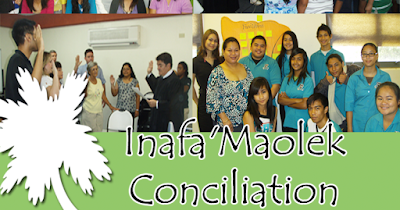The conflict resolution and mediation group Inafa'maolek captures the original meaning of the word
Here is another example of how language changes over time.
In every language, the meaning of words changes as new generations add to the possible meanings of a given word.
In Chamorro, take, for example, the word AFA'MAOLEK.
Many people today define afa'maolek (or its noun form, inafa'maolek) as cooperation, mutual assistance, reciprocity, interdependence.
But, as the video below shows, the older meaning was : reconciliation. Two former adversaries make peace. That is inafa'maolek, in its original meaning.
The term can be broken down into parts. The foundation of the word is maolek, which means "good."
The prefix fa' means "to make." Fa'maolek means "to make good."
The prefix a means "together" or "between two subjects." Afa'maolek means "to make good together" or "between each other."
The assumption here is that there had been something "bad." A disagreement, a fight, some injury or injustice. Hence the prefix "to make." Something had to be done to make peace, to make good, because prior to the fa' maolek something had been bad. It's bad, so make it good!
Let's listen to these older women, all in their 70s and 80s, point this out. In the traditional and older understanding of the word, inafa'maolek presumes that enmity or hostility needs to be "made good."
1st lady : She says that it means to make good what was once "broken" (ma yamak) between two people.
2nd lady : She mentions that the two parties had been fighting. Ginen mumu,
3rd lady : She uses a word hardly known anymore - plaito. It means "argument, discord, controversy" and the like. From the Spanish word pleito which means the same.
4th lady : She speaks in English and defines it as "making peace."
5th lady : Once again, having had a fight is mentioned.
THE MODERN, EXPANDED MEANING
MOVING BEYOND THE ORIGINAL MEANING
But the original meaning always includes a prior state of enmity between two parties, which they then repaired (fa' maolek).
In fact, whenever someone uses fa' maolek with their car, for example, the listener always takes it to mean that the car was repaired. Or, with a sick person, fina' maolek means the person was healed. The presumption is that prior to the fa' maolek, there was a negative condition. A car was broken, a person was sick.
Once again the foundation of the word : It's bad, sick, broken, at war! Make it good! Fa' maolek!


Påli', I came across a website called the Comparative Austronesian Dictionary. Naturally, it has a page dedicated to the Chamorro language.
ReplyDeletelink: http://www.trussel2.com/acd/acd-l_C.htm#Chamorro
I hope this helps with your future posts.
Pale Ric - what’s the difference between the prefixes “fa” and “na”? My great grandmother’s last name is Namauleg. Does this also mean “make it good” like fa’maolek? Thank you for your wonderful explanations!
ReplyDeleteSometimes they can be synonymous. But I would say that fa' implies a complete or essential change whereas na' implies a change in a certain quality in the thing. So fa' maolek means to repair something, to make something entirely good, working, proper. Whereas na' maolek means to give something a good quality, as in make good your writing (na' maolek i tinige'-mo). Na' bonito i kuentos-mo. Give your speech a good quality. Not being a grammarian, that's how I understand the nuance. Permanent/essential versus quality. The difference is subtle.
ReplyDeleteSi yu'os ma'åse' for your reply! I will share this with my family!
Delete